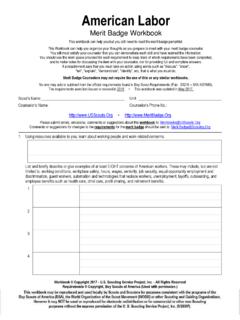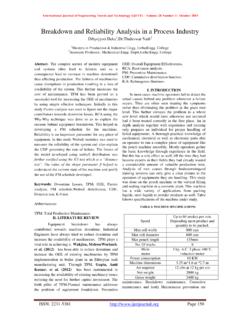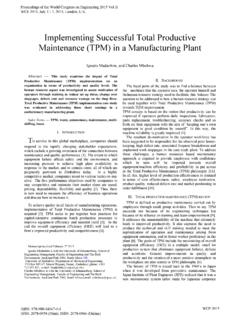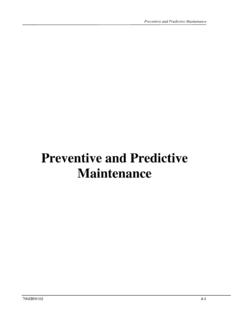Transcription of Functions, Roles and Duties of Police in General
1 Chapter 1. functions , Roles and Duties of Police in General Introduction 1. Police are one of the most ubiquitous organisations of the society. The policemen, therefore, happen to be the most visible representatives of the government. In an hour of need, danger, crisis and difficulty, when a citizen does not know, what to do and whom to approach, the Police station and a policeman happen to be the most appropriate and approachable unit and person for him. The Police are expected to be the most accessible, interactive and dynamic organisation of any society.
2 Their Roles , functions and Duties in the society are natural to be varied, and multifarious on the one hand; and complicated, knotty and complex on the other. Broadly speaking the twin Roles , which the Police are expected to play in a society are maintenance of law and maintenance of order. However, the ramifications of these two Duties are numerous, which result in making a large inventory of Duties , functions , powers, Roles and responsibilities of the Police organisation. Role, functions and Duties of the Police in General 2.
3 The role and functions of the Police in General are: (a) to uphold and enforce the law impartially, and to protect life, liberty, property, human rights, and dignity of the members of the public;. (b) to promote and preserve public order;. (c) to protect internal security, to prevent and control terrorist activities, breaches of communal harmony, militant activities and other situations affecting Internal Security;. (d) to protect public properties including roads, railways, bridges, vital installations and establishments etc.
4 Against acts of vandalism, violence or any kind of attack;. (e) to prevent crimes, and reduce the opportunities for the commission of crimes through their own preventive action and measures as well as by aiding and cooperating with other relevant agencies in implementing due measures for 1. prevention of crimes;. (f) to accurately register all complaints brought to them by a complainant or his representative, in person or received by post, e-mail or other means, and take prompt follow-up action thereon, after duly acknowledging the receipt of the complaint.
5 (g) to register and investigate all cognizable offences coming to their notice through such complaints or otherwise, duly supplying a copy of the First Information Report to the complainant, and where appropriate, to apprehend offenders, and extend requisite assistance in the prosecution of offenders;. (h) to create and maintain a feeling of security in the community, and as far as possible prevent conflicts and promote amity;. (i) to provide, as first responders, all possible help to people in situations arising out of natural or man-made disasters, and to provide active assistance to other agencies in relief and rehabilitation measures.
6 (j) to aid individual, who are in danger of physical harm to their person or property, and to provide necessary help and afford relief to people in distress situations;. (k) to facilitate orderly movement of people and vehicles, and to control and regulate traffic on roads and highways;. (l) to collect intelligence relating to matters affecting public peace, and all kind of crimes including social offences, communalism, extremism, terrorism and other matters relating to national security, and disseminate the same to all concerned agencies, besides acting, as appropriate on it themselves.
7 (m) To take charge, as a Police officer on duty, of all unclaimed property and take action for their safe custody and disposal in accordance with the procedure prescribed. (n) To train, motivate and ensure welfare of Police personnel Sec (57), Model Police Act 2006. Social Responsibilities of the Police 3. Every Police officer shall: (a) behave with the members of the public with due courtesy and decorum, particularly so in dealing with senior citizens, women, and children;. 2. (b) guide and assist members of the public, particularly senior citizen, women, children, the poor and indigent and the physically or mentally challenged individuals, who are found in helpless condition on the streets or other public places or otherwise need help and protection.
8 (c) provide all requisite assistance to victims of crime and of road accidents, and in particular ensure that they are given prompt medical aid, irrespective of medico-legal formalities, and facilities their compensation and other legal claims;. (d) ensure that in all situations, especially during conflict between communities, classes, castes and political groups, the conduct of the Police is always governed by the principles of impartiality and human rights norms, with special attention to protection of weaker sections including minorities.
9 (e) prevent harassment of women and children in public places and public transport, including stalking, making objectionable gestures, signs, remarks or harassment caused in any way;. (f) render all requisite assistance to the members of the public, particularly women, children, and the poor and indigent persons, against criminal exploitation by any person or organised group; and (g) arrange for legally permissible sustenance and shelter to every person in custody and making known to all such persons provisions of legal aid schemes available from the Government and also inform the authorities concerned in this regard.
10 (h) preserve, promote and protect human rights and interests of weaker sections, backward classes, poor, weak and the downtrodden. Sec (58), Model Police Act 2006. Maintenance of Essential Services 4. When the State Government declares any specified service to be an essential service to the community, it shall be the duty of the Police to maintain the essential services and every Police officer must obey any order given by any officer superior to him in connection with the service specified in the declaration by the government.








